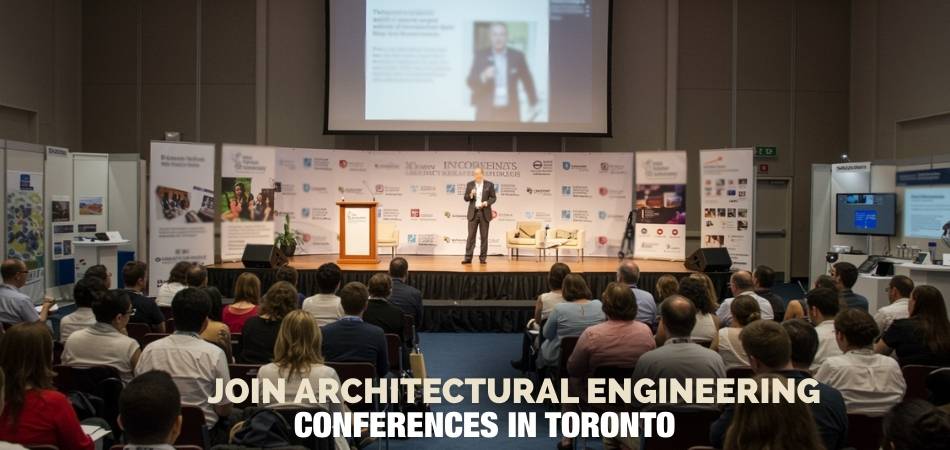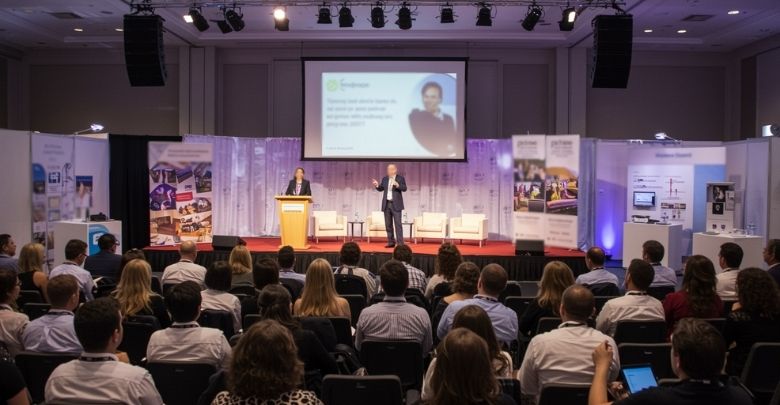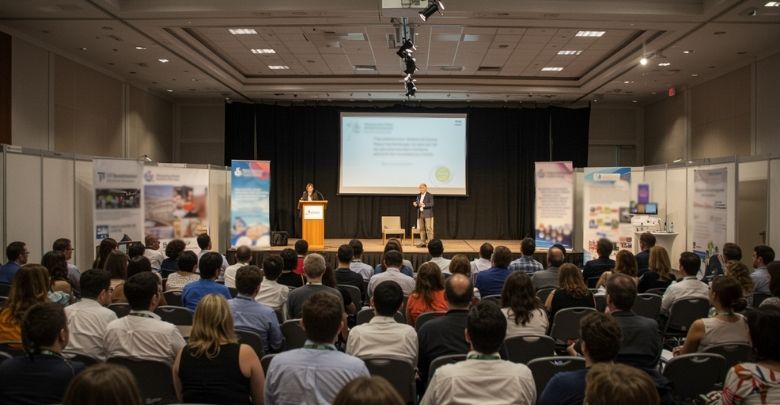Architectural engineering conferences in Toronto bring together people who are curious about how buildings are designed, planned, and built. These events offer a mix of learning, networking, and real-world ideas shared by experts. If you’re reading this, you may already be wondering who can join architectural engineering conferences in Toronto.
Anyone with an interest in architecture, engineering, or related fields can join these conferences in Toronto. This includes professional architects, structural engineers, building designers, students, researchers, tech teams, and even city planners. Most events are open to both local and international attendees, and many offer discounted passes for students.
Are you thinking about attending one or simply curious about how these events work? Do you want to know more before deciding if it’s right for you? Keep reading, because this article covers everything you need to know about attending architectural engineering conferences in Toronto.
Who Can Join Architectural Engineering Conferences in Toronto?
Architectural engineering brings together design and science to create safe and efficient spaces. These events aren’t just for experts—they welcome a wide range of people from different backgrounds. Whether you’re already working or just starting out, there’s space for you. Keep reading to see exactly who can attend.

Professional Architects
Many architects attend these events to keep up with new building trends, design tools, and sustainability techniques. They use this chance to hear from top professionals and explore new materials or systems. These gatherings also help them learn about changes in laws or codes. Many architects join panel talks or give presentations on their recent projects. It’s a great way for them to grow professionally and connect with others.
Structural Engineers
These events are important for structural engineers because they are concerned with the strength and safety of buildings. They attend to learn about advanced techniques, better materials, and safer design ideas. Engineers often use this time to ask questions and solve real problems with others in the same field. Hearing real-world examples helps them understand how to apply ideas to their own work. They find it helpful to meet others who face the same challenges.
Building Designers
Designers who plan building layouts, lighting, and interior systems are also welcome at these events. Even though they don’t handle the heavy structure, they need to work closely with engineers. That’s why many of them attend conferences in Toronto—to better connect their designs with technical systems. These events offer helpful sessions on space planning, indoor air flow, and smart design choices. Designers walk away with fresh ideas and a better understanding of the engineering side.
Engineering Students
Any student studying architecture or engineering is welcome to attend. Many conferences offer discounted passes or student programs. These events give students a chance to see how classroom topics are used in real projects. They also meet professionals and ask questions that help shape their future careers. Some even submit research posters or help out as volunteers for more experience.
Researchers and Academics
University professors and researchers often attend to share their work and gain new ideas. They might present papers, sit on discussion panels, or observe current trends in engineering. These events give them a platform to connect theory with what’s happening in the industry. It’s also a great way to find partners for future research. Some even bring students with them for extra learning.
Urban Planners and Officials
People involved in city planning and government work join to find smart building solutions. These events help them understand how design choices affect the public and city systems. They also learn about energy savings, building safety, and green development ideas. Some use what they learn to help shape local building codes or improve public projects. Working with architects and engineers at these events often leads to better planning decisions.
Tech and Product Teams
Companies that create building management or design tools also attend. These might be software makers, equipment suppliers, or smart tech developers. They join to show off their latest tools, hear feedback, and connect with customers. It helps them make better products by listening to the people who use them. For many tech experts, these events are a key part of learning and improving.
Architectural engineering events bring together people from many different roles. Whether you’re designing, researching, or learning, there’s something valuable for you. Joining even one event can open up new ideas and connections. So if you’re in the field, it’s worth attending.
How Do First-time Attendees Know if They’re Eligible to Join Toronto Architectural Engineering Conferences?
Architectural engineering conferences in Toronto often spark interest among many first-timers who are unsure about joining. Some wonder if they meet the requirements or if the events are open to everyone. It’s easier than it seems. Stick around for the answers below.
Basic Joining Criteria
Most conferences welcome participants from different backgrounds. You don’t always need to be a professional. Sometimes, being interested in topics like green buildings or urban design is enough. If you’re a student or just exploring the field, you’re often still welcome. While finding architectural engineering conferences in Toronto, you’ll notice many event pages mention who can join, which can clear things up without much guesswork.
Education or Experience
Many conferences simply ask that you have an interest in the subject. Having a background in civil, architectural, or structural engineering can help, but it’s not a must. Some events are open to learners, not just experts. If you’re studying or planning to study in this area, that’s usually enough. Even professionals from related fields like construction or planning often attend without any issue.
Type of Conference
Some events are academic, others are professional, and a few are just for fun learning. Academic ones might ask for a college ID or research paper. On the other hand, professional ones are open to anyone with career interest. Community-based ones usually skip formal requirements altogether. It’s a good idea to check the event website for the type and target audience before registering.
Check the Form
Most conferences have a registration form that lists who can sign up. You’ll often see options for students, professionals, and even guests. This section usually clears up who’s eligible. Some events will ask for basic info, like your area of study or work. If the form accepts your details without issues, that’s a strong sign you’re welcome to attend. Here are a few details you’ll often see in a conference registration form:
- Participant type (Student, Professional, Guest, Speaker, etc.)
- Full name and contact details (email, phone number)
- Academic or work background (field of study or job title)
- Preferred sessions or topics of interest
- Optional file uploads (like ID card or abstract, if needed)
Ask the Organizers
If things still feel unclear, the best step is to contact the organizers. There’s usually an email or contact form on the event website. You can write a short message explaining your background and interests. Most organizers reply quickly and will let you know if you can join. Reaching out directly can give you peace of mind before you register.
It’s usually easy to find out if you’re allowed to join. Most conferences in Toronto clearly mention who can attend. If you’re still unsure, just send a quick message to the organizers. They’re usually helpful and will guide you right away.
Which is the Best Time to Attend Your First Architectural Engineering Conference?
It can be exciting to think about going to your first conference. But choosing the right time to attend one makes a big difference. Not every season feels the same for learning and meeting people. If you’re unsure when to go, keep reading to learn more.
Spring Conferences
Many people find spring a great time for learning and traveling together. This season brings fresh ideas and good weather for attending new events. You can often meet experts who share their tips and experiences. Conferences in spring usually happen in well-known cities with many things nearby. You’ll also enjoy peaceful weather that helps you focus on learning well. Spring is a good start if you like calm and friendly events.
Summer Events
During summer, some of the largest conferences take place in big cities. These events are filled with fun workshops and hands-on learning sessions. You’ll meet many people from different places with great ideas to share. The weather is warm, and cities are full of energy and activities. But summer is also busy with holidays, so planning early helps a lot. Attending a summer event can be a fun and helpful experience.
Fall Gatherings
Autumn brings colorful streets and a cool feeling in the air. Many professional events happen during this time across different places. It’s a nice season to reflect on the year and learn new things. You’ll find speakers discussing big changes and future ideas in buildings. Cities look beautiful in fall, making the experience even better. It’s a perfect time if you enjoy calm surroundings with focused learning.
Winter Sessions
Unlike other seasons, winter conferences are usually small and quiet. You can enjoy deep discussions with professionals in a relaxed setting. These events may not have big crowds, but they offer more time with speakers. Travel can be harder, but the learning feels more personal and direct. If you prefer quiet places with clear talks, winter works well. Just be sure to check weather updates before you make any plans.
Picking the Best Time
Think about what kind of event makes you feel excited and ready. Each season gives something special, depending on what you want to learn. Look at your free time and pick a season that fits well. Going when you feel prepared will help you enjoy it even more.
There’s no perfect answer for when to attend your first conference. Just pick the time that feels easiest and most comfortable for you. What matters most is being ready to listen, ask, and learn. Take your time and explore what’s waiting for you at your first event.
Is International Participation Allowed in Architectural Engineering Conferences in Toronto?
Many international participants are often curious about joining conferences in other countries. Toronto is a popular choice because of its active events and welcoming crowd. But some may feel unsure about the steps involved. Check the sections below to know how you can take part.
Open for All
International attendees are usually welcome at most architectural engineering conferences in Toronto. You don’t have to be living in Canada to attend. Organizers often open the event to participants from different parts of the world. This makes the experience richer for everyone involved. If you find a conference you like, just check if they accept global registrations, which they usually do unless stated otherwise.
Entry Requirements
It’s important to check if you need a visa to travel to Canada for the event. Some countries require a visitor visa, and you may need an invitation letter from the organizers to apply. Organizers usually help with this step by sending documents after registration. Make sure to apply early, as visa processes can take some time. Always keep your passport ready and check the official Canadian immigration website for updates.
Registration Process
You’ll need to fill out an online form to book your spot. This form usually asks for your name, background, and purpose for joining. Once completed, you’ll get a confirmation email with the next steps. You may also find payment options listed at the end of the form. Some organizers offer early bird rates or discounts if you register weeks ahead of the event. Besides filling in your basic details, here are some extra things you should focus on during the registration process:
- Check the deadline for registration, especially if early bird pricing is available.
- Select the correct participant type (student, professional, speaker, etc.).
- Review the payment section carefully—see if it’s refundable or not.
- Look for add-ons, like workshop passes or networking sessions.
- Confirm your email address is correct to avoid missing your confirmation email.
- See if you need to upload documents, like a student ID or abstract (if presenting).
- Save a copy of your registration summary or payment receipt for your records.
Travel and Stay
Booking your flight early is a smart move since prices go up closer to the event date. Also, check if the conference has suggested hotels or partner rates. Some events mention nearby places to stay that are easy to get to. Public transport in Toronto is easy to use, and venues are often near train or bus stations. Plan your trip at least a few weeks in advance to stay relaxed.
Things to Consider
Planning everything early can save a lot of trouble later. When checking event details, you might also notice a small section about fees or passes. That’s where many people quietly check the cost of attending an architectural engineering conference in Toronto, just to stay on budget. These pages often give a clear breakdown of what’s included, like meals, materials, or access to extra sessions.
Joining a conference in Toronto from another country is easier than most people think. Just make sure to read all the details, prepare your documents, and register on time. Once you’re ready, it’s a great way to connect and learn. Don’t miss the chance if you feel excited about it.
Frequently Asked Questions
If you’re thinking about joining a conference but still have some questions, don’t worry. Many people feel unsure before attending their first event. That’s why we’ve listed some simple and helpful FAQs to make things clearer. Read through them to feel more confident before signing up.
What Should I Prepare Before Attending the Conference?
Before going, it’s helpful to check the event schedule online. Try to pick the sessions you want to attend the most. Bring a notebook or tablet if you like taking notes. Also, wear something neat and comfortable for a full day of learning.
Will I Get a Certificate After the Conference?
Most events give certificates if you attend the full program. These certificates are useful to show you took part in a professional event. You might need to request it or download it from your email. It’s always a good idea to check this before the event ends.
Can I Ask Questions During the Sessions?
Yes, most speakers give time at the end for questions. You can ask something if you’re curious or didn’t understand something. Keep your questions clear and short so others get a turn as well. It’s a good way to learn more and stay involved.
Do I Need to Bring Anything to the Event?
You don’t need to carry too many things. Just bring your ID, registration pass, notebook, and maybe a water bottle. Some people also carry business cards if they want to meet others. A small bag with these items should be enough for the day.
Will Food Be Available at the Conference?
Many conferences include food like snacks or lunch during breaks. Some offer free food, while others might give coupons or meal options. It’s smart to check this info before going, especially if you have food allergies. You can also bring your own food just to be safe.
Can I Take Photos or Record Presentations?
Sometimes you can take photos, but not always during every session. Some speakers may ask not to be recorded for privacy or copyright reasons. It’s best to ask or look for signs before taking photos. When in doubt, follow the rules shared at the event.
What Kind of Things Will I Learn at These Conferences?
You’ll hear about building safety, smart design, and new tools used in real work. Some talks will show how science and design come together in projects. Others may focus on solving building problems in better ways. No matter your level, there’s always something to learn.
Are There Fun or Creative Activities at the Event?
Yes, some events include group challenges, model displays, or design games. These are great chances to have fun and learn at the same time. You might even work with people you just met. These creative tasks help you think in new and different ways.
What Should I Do If I Feel Nervous Attending Alone?
It’s totally normal to feel nervous at your first event. Try saying hello to someone during breaks or asking a question in a session. Many people attend alone and are happy to chat. You’ll feel more comfortable as the day goes on.
How Can I Stay Connected After the Event Ends?
After the event, you can connect with people through email or social media. Some events give a list of contacts or groups you can join. You can also follow the event’s page for updates or future news. Staying in touch helps you keep learning and growing.
Bottom Line
Architectural engineering events in Toronto bring together a wide mix of people, from designers and engineers to students and researchers. If you’re still wondering who can join architectural engineering conferences in Toronto, the answer is simple: anyone with an interest in building design and engineering can attend.
Before signing up, remember to check the event type, prepare your documents early, and read the registration form carefully. Look out for discounts, plan your travel in advance, and don’t be afraid to ask questions. We hope your first conference experience goes smoothly and brings you new ideas, learning, and great connections. Best of luck!







